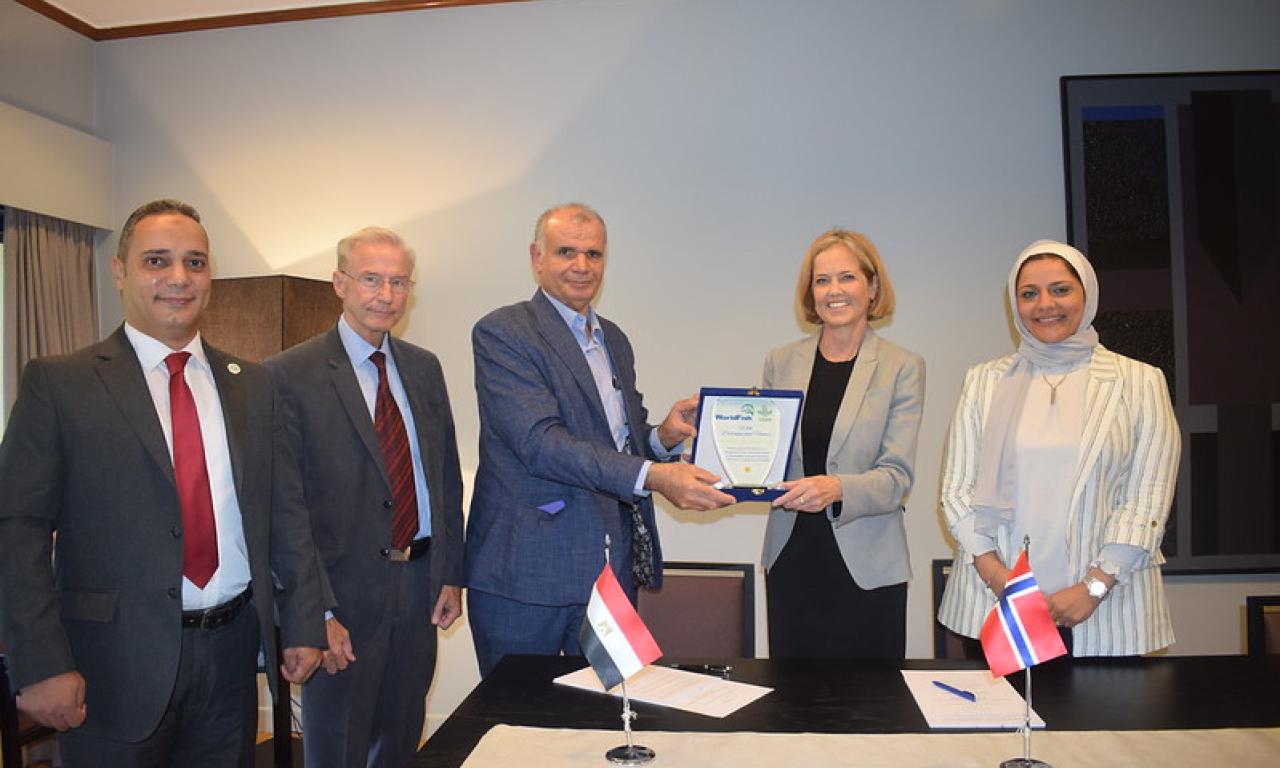
The four-year collaboration aims to increase the incomes of 5,000 fish producers, processors and other fish value chain actors through renewable energy technologies.
CAIRO – WorldFish embarked on a groundbreaking initiative with Norway aimed at refining, testing, and scaling innovative renewable energy solutions for the aquaculture sector in Egypt. The four-year initiative, Center for Renewable Energy in Aquaculture (CeREA), is funded by the Royal Norwegian Embassy in Cairo until 2027.
The initiative reflects Norway's commitment to enhancing nutrition, promoting job and value creation and empowering local fish value chain actors with climate-smart technologies, particularly small- and medium-scale fish farmers in Africa.
Commenting on the impact of the program, the Ambassador of Norway to Egypt H.E. Hilde Klemetsdal said:
“We are delighted to sign the agreement today with WorldFish. The project will enable 5,000 fish producers, processors and other fish value chain actors to increase their productivity and incomes, leading to a reduction in food waste and loss and promoting the transformation to more energy-efficient and climate-smart food value chains. The project is a prime example of an initiative that aligns with Norway's development cooperation priorities. I am very pleased to see so many important and timely elements, including food security, climate adaptation and gender equality addressed in one program.”
WorldFish has been supporting the Egyptian aquaculture and fisheries sector since the launch of its research and training center at Abbassa in Sharkia in 1998. A key focus of the center has been improving fish genetics and research capacity to transform Egypt into a role model for sub-Saharan African aquaculture development.
In order to maximize the impact of CeREA, the new initiative, WorldFish will work closely with a diverse range of national and international partners, including research institutions, public universities and the private sector.
On the significance of CeREA, WorldFish Director General and CGIAR Senior Director of Aquatic Food Systems Dr. Essam Yassin Mohammed said:
“We firmly believe that sustainable development of aquatic food systems holds immense potential in addressing global food security challenges. Through CeREA and our partnership with Norway, we strive to put aquaculture on a low-emission development pathway for healthier people and planet.”
More than 600 million people in developing nations rely on aquatic foods, which encompass a wide range of animals, plants and microorganisms cultivated and harvested from water bodies. These aquatic resources play a crucial role in supporting livelihoods as well as ensuring food and nutrition security.
CeREA will be a flagship initiative of WorldFish’s Fish for Africa Innovation Hub (FAIH) sited at its Abbassa research center established to develop and deliver cutting-edge innovations in the region. Through FAIH, WorldFish aims to generate 6 million new jobs in African aquaculture by 2030 while promoting climate adaptation, gender equity, and food and nutrition security.
Sharing his vision for the outcomes of CeREA, WorldFish Country Director for Egypt Dr. Ahmed Nasr-Allah said:
“CeREA is a unique collaboration expected to catalyze the emergence of a cadre of Egyptians who can effectively tackle some of the most critical and complex development challenges in Egypt and Africa using an evidence-based approach.”
The official signing of the agreement at the Royal Norwegian Embassy in Cairo was witnessed by Arild Øksnevad, Counselor and Head of Development and Business Cooperation, and Eithar Soliman, Development Cooperation Advisor at the Embassy of Norway in Cairo, as well as Sameh Ahmed, the Finance Manager, and Menna Mosbah, the Gender Expert and Communications Representative for WorldFish in Egypt.
###
NOTES TO EDITOR
Visit the WorldFish website for more information: https://www.worldfishcenter.org/
Photos of the signing ceremony:
Photos of the Abbassa Research and Training Center, Egypt:
Press contact:
Sean Lee Kuan Shern
WorldFish Science Communications Specialist
Email: K.Lee@cgiar.org
About WorldFish
WorldFish is an international research organization that creates, advances and translates aquatic food systems science into scalable solutions. We vision an inclusive world of healthy, well-nourished people and a sustainable blue planet, now and in the future. Our mission is to end hunger and advance progress on the 2030 Sustainable Development Goals through science and innovation to transform food, land and water systems with aquatic foods for healthier people and the planet.
For over 45 years, WorldFish's data, evidence and insights have shaped practices, policies and investments to end hunger and advance sustainable development in low- and middle-income countries. We have a global presence across 20 countries in Asia, Africa and the Pacific, with 460 staff of 30 nationalities deployed where the most significant sustainable development challenges can be addressed through holistic aquatic food systems solutions. Embedded in local, national and international partnerships, our work sets agendas, builds capacities and supports decision-making for climate action, food and nutrition security, sustainable fisheries and aquaculture, blue economy, One Health and AgriTech, integrating gender, youth and social inclusion.
A core element of the 2030 WorldFish Research and Innovation Strategy: Aquatic Foods for Healthy People and Planet is focused on building the resilience of aquatic food systems to shocks, which is critical to COVID-19 response and recovery.
WorldFish is part of CGIAR, the world's largest agricultural research and innovation network.
For more information, please visit https://www.worldfishcenter.org.
About CGIAR
CGIAR is a global research partnership for a food-secure future. CGIAR science is dedicated to transforming food, land, and water systems in a climate crisis. Its research is carried out by 13 CGIAR Centers/Alliances in close collaboration with hundreds of partners, including national and regional research institutes, civil society organizations, academia, development organizations and the private sector.
We would like to thank all Funders who support this research through their contributions to the CGIAR Trust Fund.
For more information, please visit https://www.cgiar.org.